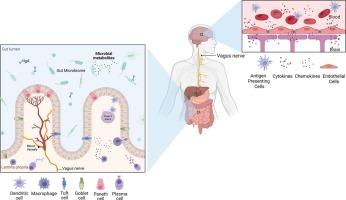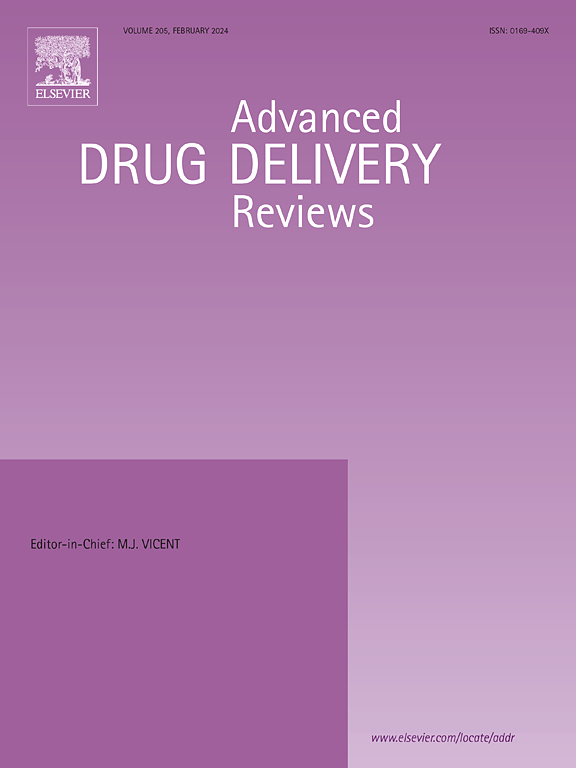肠道-脑免疫相互作用:探索益生菌作为神经系统疾病的药物传递平台
IF 17.6
1区 医学
Q1 PHARMACOLOGY & PHARMACY
引用次数: 0
摘要
肠-脑-免疫(GBI)轴连接肠道微生物、神经组织和免疫系统细胞,在人类健康中起着关键作用,特别是在与神经系统疾病有关的方面。过去几十年在这一领域的研究表明,微生物群的破坏与慢性炎症有关,慢性炎症可能导致神经系统疾病,包括帕金森病、阿尔茨海默病和其他精神健康障碍。随着我们对这些系统之间的联系有了更深入的了解,人们正在探索通过调节GBI轴来治疗疾病的新治疗策略。最有希望的方法之一是使用活的生物疗法,如工程益生菌,作为下一代药物输送系统。这些活的微生物可以被设计成将特定的治疗化合物输送到肠道和大脑,以调节免疫反应并从源头上减少炎症。益生菌和活体生物疗法可以通过影响微生物组和免疫系统来提供有针对性的治疗神经系统疾病的方法。在这篇综述中,我们概述了与GBI相互作用有关的研究和机制,并强调了这些创新疗法在治疗神经系统疾病方面的潜力,强调了它们在通过靶向、基于微生物组的干预改善精准医疗方面的作用。本文章由计算机程序翻译,如有差异,请以英文原文为准。


Gut-brain-immune interactions: exploring probiotics as a drug delivery platform for neurological disease
The gut-brain-immune (GBI) axis, connecting gut microbes, neural tissue, and the cells of the immune system, plays a critical role in human health, particularly in relation to neurological diseases. Research in this field over the last few decades shows that disruptions in the microbiome have been linked to chronic inflammation, which may contribute to neurological conditions, including Parkinson’s disease, Alzheimer’s disease, and other mental health disorders. As we gain a greater understanding of the links between these systems, novel therapeutic strategies are being explored to treat disease by modulation of the GBI axis. One of the most promising approaches is the use of live biotherapeutics, such as engineered probiotics, as next-generation drug delivery systems. These live microorganisms can be designed to deliver specific therapeutic compounds to the gut and brain in order to modulate immune responses and reduce inflammation at the source. Probiotics and live biotherapeutics can offer a targeted approach to treating neurological diseases by influencing both the microbiome and immune system. In this review, we outline the research and mechanisms that have been implicated in GBI interactions and highlight the potential of these innovative therapies in treating neurological disorders, emphasizing their role in improving precision medicine through targeted, microbiome-based interventions.
求助全文
通过发布文献求助,成功后即可免费获取论文全文。
去求助
来源期刊
CiteScore
28.10
自引率
5.00%
发文量
294
审稿时长
15.1 weeks
期刊介绍:
The aim of the Journal is to provide a forum for the critical analysis of advanced drug and gene delivery systems and their applications in human and veterinary medicine. The Journal has a broad scope, covering the key issues for effective drug and gene delivery, from administration to site-specific delivery.
In general, the Journal publishes review articles in a Theme Issue format. Each Theme Issue provides a comprehensive and critical examination of current and emerging research on the design and development of advanced drug and gene delivery systems and their application to experimental and clinical therapeutics. The goal is to illustrate the pivotal role of a multidisciplinary approach to modern drug delivery, encompassing the application of sound biological and physicochemical principles to the engineering of drug delivery systems to meet the therapeutic need at hand. Importantly the Editorial Team of ADDR asks that the authors effectively window the extensive volume of literature, pick the important contributions and explain their importance, produce a forward looking identification of the challenges facing the field and produce a Conclusions section with expert recommendations to address the issues.

 求助内容:
求助内容: 应助结果提醒方式:
应助结果提醒方式:


